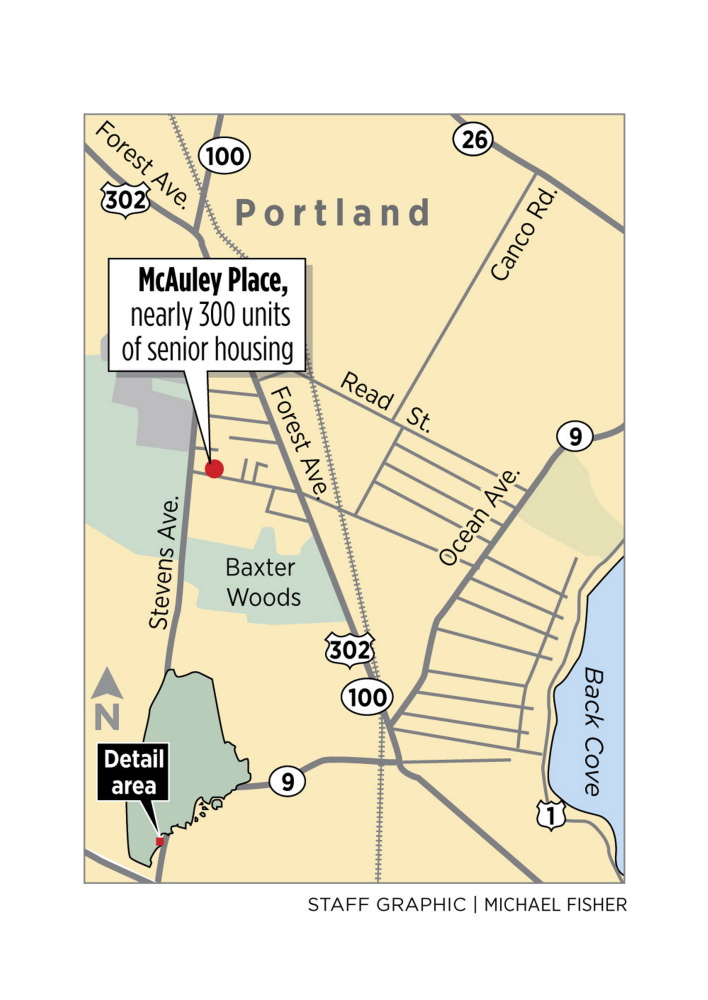Only two weeks after approving a controversial rezoning proposal along the eastern waterfront, Portland city councilors will be in the hot seat again Monday night as they consider a request to rezone 13½ acres of land in the Deering Center neighborhood to allow for hundreds of units of senior housing.
The request by Seacoast Management would more than double the number of housing units that could be built under current zoning and has drawn intense opposition by neighborhood residents, who are concerned about the project’s density and the potential impact on traffic. But developers say those concerns are being exaggerated and that senior housing is sorely needed.
The project is being proposed on the Catherine McAuley High School campus at 605 Stevens Ave., which is on the border of districts represented by Councilors David Brenerman and Justin Costa, both of whom are being heavily lobbied by opponents.
If the zone change is approved, nearly 300 units of housing for people 55 and older would be allowed on the site.
“Mostly, we’re hearing from people who are opposed,” Brenerman said Friday afternoon. “They’ve been more aggressive in meeting with councilors.”
Seacoast Management is proposing to convert the historic Sisters of Mercy convent – also called the “Mother House,” constructed in 1908 – into 88 units of senior housing. Seacoast’s development director, Matthew Teare, said 66 units would be affordable, with most rents ranging from $600 to $800. There would also be 22 market-rate units, with rents topping $1,000. The building would be renovated in accordance with historic standards, he said.
“We all know from (Maine’s) demographics how important senior housing is,” Teare said. “A senior development is much quieter and has much less traffic and noise than other residential developments.”
A future phase of the project could include up to 200 additional owner-occupied units in four or five new buildings that would be constructed on what are now McAuley’s athletic fields. Developers are offering McAuley a 25-year lease, so the high school can remain on Stevens Avenue, though the school would have to find other athletic fields.
The project was forwarded to the council by the Planning Board with a 4-0 vote in support of the rezoning after a two-hour public hearing.
Area residents, however, fear the project would damage the neighborhood by overloading an already busy Stevens Avenue with additional traffic.
John Thibodeau of Clinton Street and Bobbi Cope of Concord Street have been organizing the opposition group, known as Preserve Deering Neighborhood. Thibodeau said the group has collected 400 signatures from residents who want to preserve the existing zoning, which would allow for roughly 130 units of housing, as well as the Mother House.
Thibodeau said the project is just “way too big” for a neighborhood with seven schools and children who walk and bike to school.
“We love our neighborhood. It’s a special neighborhood. It’s unique to Portland,” Thibodeau said. “We feel like this is an urban project, with urban density.”
Teare said senior housing carries only one-third of the impacts of a single-family or other commercial or institutional development. In addition to less traffic, seniors will not be sending children to area schools, and when seniors downsize additional housing opportunities become available for younger families, he said.
But Thibodeau said that many people over the age of 55 continue to drive. “My parents are in their 80s and they drive every day,” he said.
Brenerman said he has asked staff to prepare several amendments to help allay those concerns. One amendment would reduce the size of the project by eliminating 30 to 50 units, while another would require the developer to go through a master planning process to ensure community input in the future phase.
Costa said he is still weighing arguments on both sides of the issue, particularly the concerns of his district.
“I’m still pretty undecided at this point,” Costa said. “Hopefully, we can figure out a way to address a lot of the concerns in the neighborhood, and if we are satisfied we can, … it will probably have my support. If we can’t address some of those concerns, it probably won’t.”
Send questions/comments to the editors.



